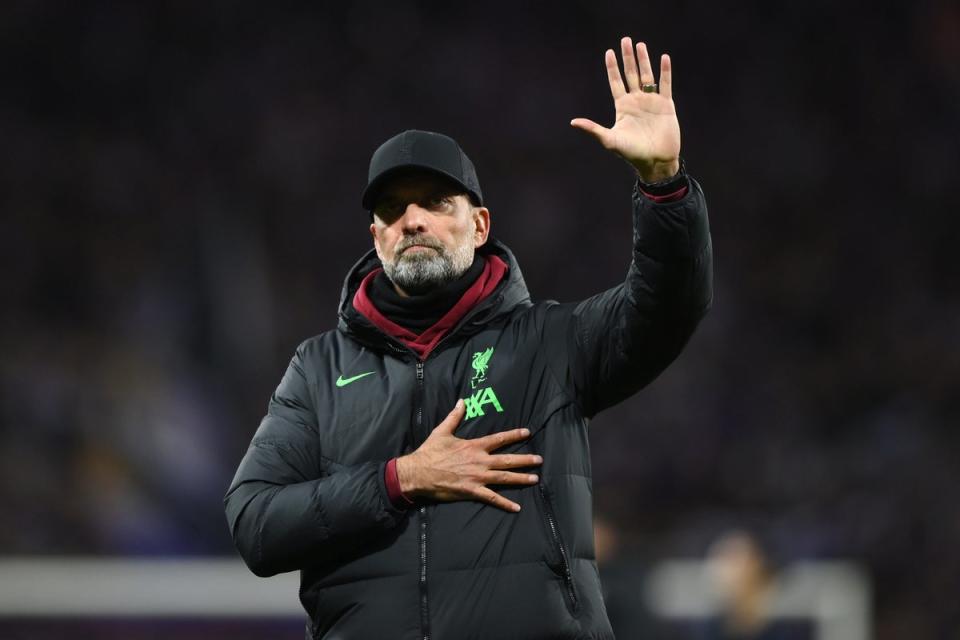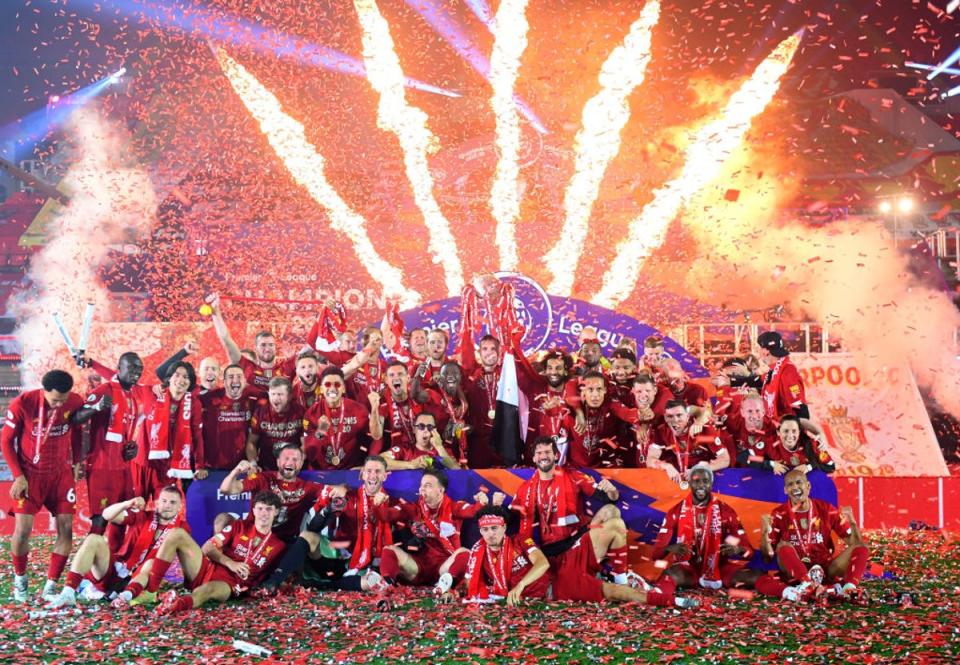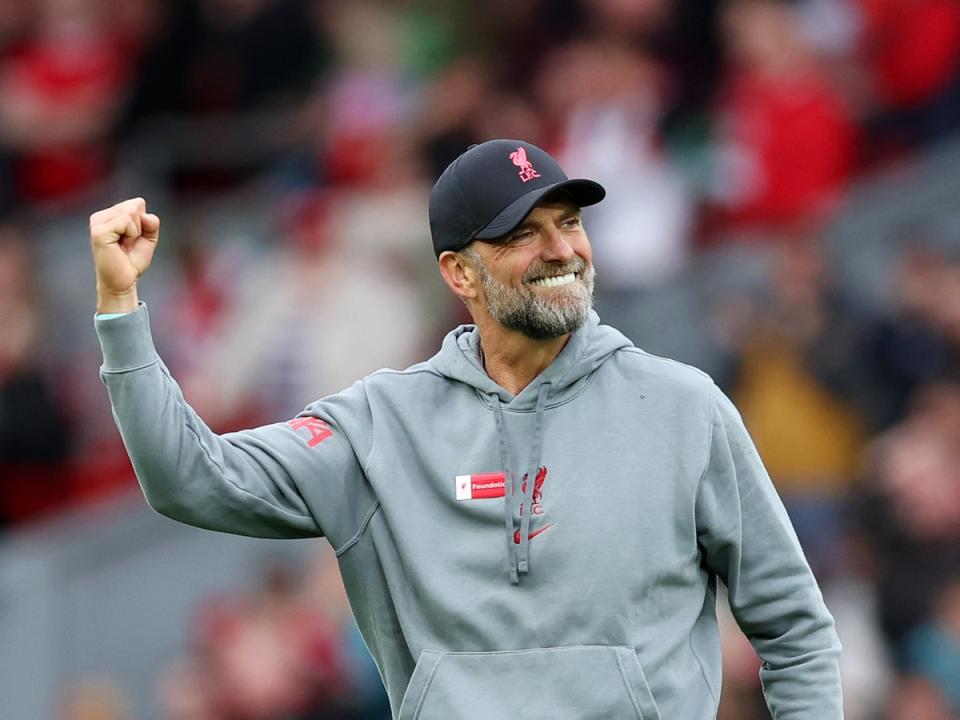Jurgen Klopp defined Liverpool with energy – his ability to shock endures
Jurgen Klopp’s reign at Liverpool has been defined by the capacity for the stunning, so perhaps it is fitting that he saved the greatest shock until the end: or the news of the end, anyway. Klopp’s statement that he will leave at the end of the season became the most unexpected development of all: bigger than the four-goal turnaround against Barcelona or the succession of late winners or even Alisson’s injury-time header against West Bromwich Albion.
A sudden announcement came amid a second quest for a quadruple in three seasons: Klopp will go with proof his powers remain intact, with Liverpool’s resurgence this season an illustration that he was building a second fine team, potentially a second brilliant one. He will leave with Liverpool wanting more: perhaps that would always have been the case.
Klopp has transformed Liverpool with his tactics and his charisma. His influence has been greater even than his medal collection, impressive as it is. One Premier League title is a meagre return for the brilliance of his tenure: three Champions League finals a better reflection of the difference he has made to what was a moribund club. He inherited a club 10th in England and made them champions of the world, a prize secured during a spell of 35 wins in 36 Premier League games.
The German also had two years left on his contract. They had threatened to be glorious. But he cited a lack of energy; he had looked more tired last season than this. But Klopp powered Liverpool with his energy; he rebranded one of the world’s biggest clubs, both with his beloved gegenpressing and by turning doubters into believers, as he promised at his unveiling eight years ago.
Klopp was Liverpool’s great communicator, winning people over in his second tongue, his fist pumps in front of the Kop bookending afternoons or evenings that began with “You’ll Never Walk Alone”. He became part of the Anfield experience.
Time will allow for a fuller reflection of Klopp’s achievements: certainly, his departure reframes the rest of his valedictory season. Should he win the league with a second team, it would increase the comparisons with Bill Shankly, another iconic figure and transformative manager. For now, it is no exaggeration to say Klopp belongs in Liverpool’s three greatest managers, along with Shankly and Bob Paisley. He is Pep Guardiola’s greatest rival and, but for the Manchester City manager, his own trophy cabinet would have been rather bigger.
Klopp was the outsider who came to define Liverpool: not a Scouser, or a former player or a graduate of the boot room, but a man who became the face of the club. Klopp’s gameplan was based on a shared team ethic. He made stars of many of his players and yet for many, the biggest star was Klopp himself.

There was an alchemy to his excellence. Andy Robertson was relegated with Hull and Gini Wijnaldum went down with Newcastle. Mohamed Salah’s previous experience of English football was an unfulfilling spell at Chelsea that yielded just two goals. Jordan Henderson was the player Brendan Rodgers had tried to sell to Fulham, Roberto Firmino the signing he didn’t understand.
Under Klopp, they became cornerstones of an all-conquering side, the false nine Firmino defining their unique blueprint. The sense of an end of an era came last season – and offered echoes of Klopp’s troubled final campaign in charge of Borussia Dortmund – but the renewal and revival this year brought evidence of his enduring skill: of his faith in both players and people, of the manager’s capacity to turn games with his substitutions and reshuffles, of the sense his teams were greater than the sum of their parts.
At their best, Klopp’s Liverpool played with ferocious pace and rare fearlessness. They offered excitement few could rival. He brought the great European nights back to Anfield when, after one top-four finish in six seasons before his appointment, they had become strangers to the Champions League. He ended the 30-year wait to become champions of England.

He did so in a way that made him not just people’s champion but also Fenway Sports Group’s perfect manager: someone who never pleaded in public for more players, who improved the footballers he did have, who took a long-term approach, who trusted in the academy and who, commercially, was Liverpool’s biggest asset.
It makes him an impossible act to follow. Klopp will leave a supersized shadow, FSG the task of finding a worthy successor. Few managers change clubs, let alone those of Liverpool’s size, with the force of personality alone but Jurgen Klopp did. And, just as he emulated Liverpool legends with his feats, he did again by stunning the supporters with his news. Much as when Shankly retired in 1974 and Kenny Dalglish stood down in 1991, Klopp has sent Liverpool into shock.


 Yahoo Sport
Yahoo Sport 



































































